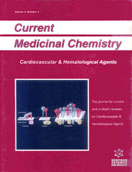Abstract
Accumulating evidence strongly implicates the critical roles of intracellular signaling of angiotensin II (AngII) in mediating cardiovascular diseases such as hypertension, atherosclerosis, and restenosis after vascular injury. The importance of AngII signals has also been reported in endothelial dysfunction and insulin resistance, two strong predictors of cardiovascular disease. Through its G protein-coupled AngII type-1 receptor (AT1), AngII activates various intracellular protein kinases, such as receptor or non-receptor tyrosine kinases and serine/threonine kinases. Activation of these kinases requires both G protein-dependent and independent pathways, reactive oxygen species and a metalloprotease, and each kinase could be involved specifically in mediating pathophysiological function of the AT1 receptor target organs. In fact, some of the kinases are indispensable for AngII-induced hypertrophy and migration. The role of these AT1-activated kinases in mediating vascular remodeling, vascular contractility, endothelial dysfunction, and insulin resistance will be discussed in this review. In addition, the AT1 receptor undergoes rapid phosphorylation, desensitization, and internalization upon AngII stimulation. Recent studies with site-directed mutagenesis of the AT1 receptor not only elucidated a G protein interaction and desensitization of the receptor, but also demonstrated a structural requirement of the receptor for downstream signal transduction. Thus, AT1 mutants have provided an excellent means to examine the mechanism of signal transduction and their significance in mediating AngII function. Taken together, in this review, we will focus our discussion on the recent findings of the signal transduction research elucidating novel signaling mechanisms of the AT1 receptor that are relevant to the vascular pathophysiology of AngII.
Keywords: angiotensin II, signal transduction, epidermal growth factor receptor, transactivation, vascular smooth muscle cells, adam, pyk, src
 3
3











